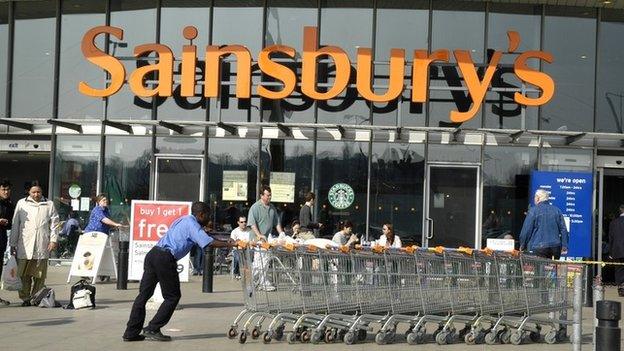Sainsbury's half-year profits fall by 18%
- Published

Supermarket group Sainsbury's has reported a fall in half-year profits, citing a "particularly challenging" market.
Underlying pre-tax profits for the 28 weeks to 26 September fell 17.9% to £308m.
The UK's third-biggest grocer is in a continued pricing war, and facing challenges from discount chains.
The firm said that retail sales, excluding fuel, were down 0.1%. Like-for-like sales fell 1.6%.
At the end of September the company reported its seventh consecutive quarter of falling underlying sales.
The company's chief executive, Mike Coupe, admitted that "the grocery retail marketplace remains challenging" but said he was "confident we are making progress".
Sainsbury's CEO Mike Coupe: "We have a more robust and resilient business to build from"
Online boost
The £308m profits figure was its lowest first-half profit since 2010, and down from £375m last year. However, the figure was still ahead of analysts' expectations of about £293m.
Sainsbury's said food sales had declined by nearly 1%, but clothing performed strongly, with sales up by close to 10%.
Sales at supermarkets fell by just over 2%, driven by food deflation, lower like-for-like volumes, and "customers shopping across multiple channels".
However, convenience stores delivered sales growth of nearly 11%, while online grocery orders delivered sales growth of 7%.
The latest research from Kantar Worldpanel found that the firm was the only major chain to see sales rise in the 12 weeks to 11 October, lifting its market share to 16.1%.
Sugar issues
Speaking to BBC Radio 4's Today programme Mr Coupe said the company was taking action to cut down on sugar in its products and to cut waste.
The firm said it had removed close to 35 tonnes of sugar from its own-brand juices and juice drinks, and continued "to reformulate our products to improve quality and taste and to reduce sugar".
He said there had to be a "holistic approach" from society to cutting childhood obesity, including more information about calories generally, and looking at ways to burn off calories.
On waste, he said the firm was looking to provide the quality in products - such as fruit and vegetables - that customers demanded, including with regards to shape, texture, and "visual cues".
The firm, he said, donated unsold food to charities, or sent it for conversion into animal feed.
- Published30 September 2015

- Published27 August 2015
